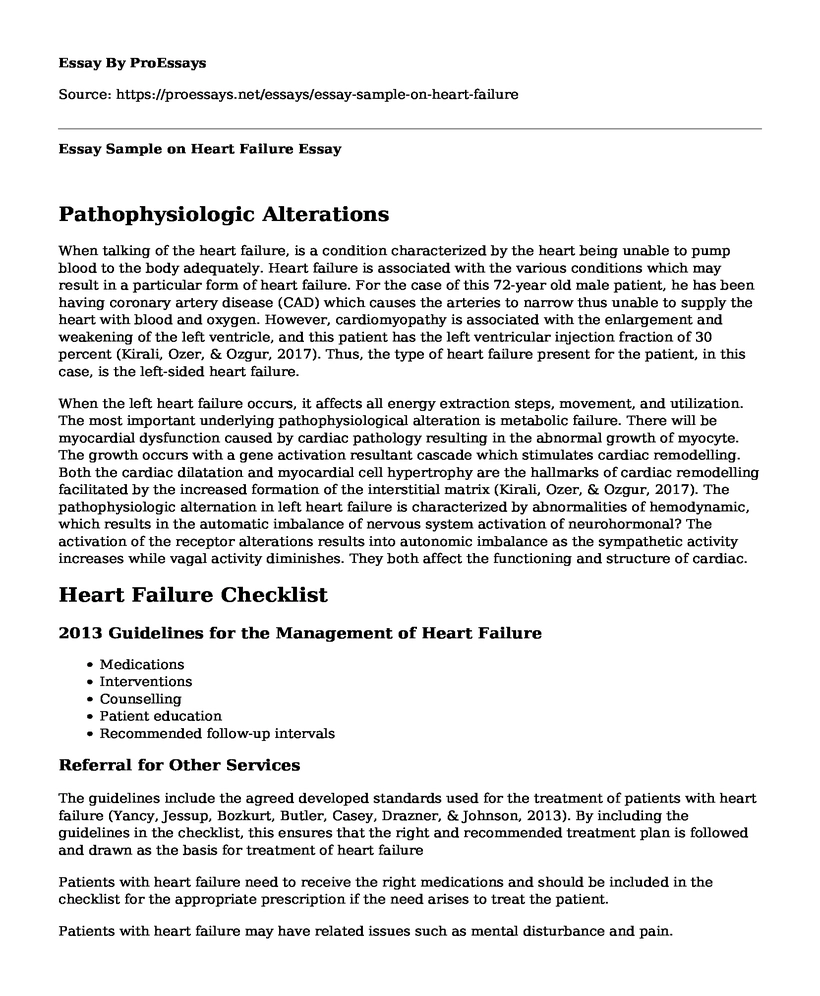Pathophysiologic Alterations
When talking of the heart failure, is a condition characterized by the heart being unable to pump blood to the body adequately. Heart failure is associated with the various conditions which may result in a particular form of heart failure. For the case of this 72-year old male patient, he has been having coronary artery disease (CAD) which causes the arteries to narrow thus unable to supply the heart with blood and oxygen. However, cardiomyopathy is associated with the enlargement and weakening of the left ventricle, and this patient has the left ventricular injection fraction of 30 percent (Kirali, Ozer, & Ozgur, 2017). Thus, the type of heart failure present for the patient, in this case, is the left-sided heart failure.
When the left heart failure occurs, it affects all energy extraction steps, movement, and utilization. The most important underlying pathophysiological alteration is metabolic failure. There will be myocardial dysfunction caused by cardiac pathology resulting in the abnormal growth of myocyte. The growth occurs with a gene activation resultant cascade which stimulates cardiac remodelling. Both the cardiac dilatation and myocardial cell hypertrophy are the hallmarks of cardiac remodelling facilitated by the increased formation of the interstitial matrix (Kirali, Ozer, & Ozgur, 2017). The pathophysiologic alternation in left heart failure is characterized by abnormalities of hemodynamic, which results in the automatic imbalance of nervous system activation of neurohormonal? The activation of the receptor alterations results into autonomic imbalance as the sympathetic activity increases while vagal activity diminishes. They both affect the functioning and structure of cardiac.
Heart Failure Checklist
2013 Guidelines for the Management of Heart Failure
- Medications
- Interventions
- Counselling
- Patient education
- Recommended follow-up intervals
Referral for Other Services
The guidelines include the agreed developed standards used for the treatment of patients with heart failure (Yancy, Jessup, Bozkurt, Butler, Casey, Drazner, & Johnson, 2013). By including the guidelines in the checklist, this ensures that the right and recommended treatment plan is followed and drawn as the basis for treatment of heart failure
Patients with heart failure need to receive the right medications and should be included in the checklist for the appropriate prescription if the need arises to treat the patient.
Patients with heart failure may have related issues such as mental disturbance and pain. Interventions should be given priority to help handles these related cases hence its inclusion.
These patients as well may have a mental disturbance, a situation that may require counselling and therefore should be mandatory when managing the problem of heart failure.
Patient education needs to be among the considerations for proper management of heart failure in the sense that the treatment is complex and would require adequate sophistication and patient ability to follow the prescription
Patients with heart failure need regular follow up and monitoring to ensure they abide by the recommended management measures.
In some cases, there may arise the need for referral for other services that will enhance the heart failure recovery and normal functioning of the body structure.
Compliance
The treatment and management of heart failure is a process, complicated, and sometimes may lead to other complications. However, there is a need for the patient to comply with the prescribed medical program to prevent exacerbations of heart failure and hospital admission/readmission. Compliance will help reduce most of the symptoms of the heart failure and allow the normal functioning of the arteries. At the same time, other acute complications developing that are related to the dysfunctioning of the heart may be prevented through medical compliance. With the right medication, heart failure is treatable conditions that will allow the functioning of the blood vessels come to normal.
References
Kirali, K., Ozer, T., & Ozgur, M. M. (2017). Pathophysiology in heart failure. In Cardiomyopathies-Types and Treatments. InTech.Yancy, C. W., Jessup, M., Bozkurt, B., Butler, J., Casey, D. E., Drazner, M. H. & Johnson, M. R. (2013). 2013 ACCF/AHA guideline for the management of heart failure: executive summary: a report of the American College of Cardiology Foundation/American Heart Association Task Force on practice guidelines. Journal of the American College of Cardiology, 62(16), 1495-1539.
Cite this page
Essay Sample on Heart Failure. (2022, Oct 21). Retrieved from https://proessays.net/essays/essay-sample-on-heart-failure
If you are the original author of this essay and no longer wish to have it published on the ProEssays website, please click below to request its removal:
- Protect Yourself Against HPV Essay
- Paper Example on Alzheimer in the Form of Its Pathophysiology
- Professional Socialization in the Mental Health Nursing Profession Paper Example
- Essay Sample on Sporting Risk Management Decisions
- Paper Example on 30-Day Challenge: Get 6 Hours of Sleep & Improve Lifestyle
- Essay Example on State's Child Welfare System: Challenges & Solutions
- Essay on Trump's Chaotic Response to COVID-19: Narcissistic Psychopath or Misjudgment?







